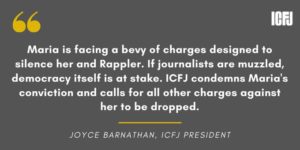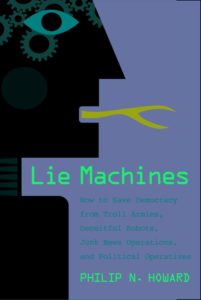High-profile journalist Maria Ressa has been found guilty of libel in the Philippines’ in a case seen as a test of the country’s media freedom, the BBC reports. The former CNN journalist is the head of a news site that’s critical of strongman President Rodrigo Duterte. A writer for the site, Rappler, was also convicted. Both have been released on bail pending appeal – but could face six years in prison. In a country where journalists are under threat, Ressa’s case became symbolic and closely-followed – both domestically and internationally.
“Rappler and I were not the only ones on trial,” Ressa told the BBC after the verdict. “I think what you’re seeing is death by a thousand cuts – not just of press freedom but of democracy.”
The Consortium on Democracy and Disinformation, in partnership with Rappler, today held a forum (below) to discuss the implications of the cyber libel case and the verdict against Rappler, Maria Ressa, and former researcher Rey Santos.
 We strongly condemn today’s conviction of @mariaressa, a champion of press freedom and our 2018 @ICFJKnight Award winner, the International Center for Journalists @ICFJ tweeted. This is a devastating blow for independent journalism not just in the Philippines but everywhere. #DefendPressFreedom #CourageON
We strongly condemn today’s conviction of @mariaressa, a champion of press freedom and our 2018 @ICFJKnight Award winner, the International Center for Journalists @ICFJ tweeted. This is a devastating blow for independent journalism not just in the Philippines but everywhere. #DefendPressFreedom #CourageON
 Through massive networks of fake accounts, junk news sites, and the strategic use of conspiracy theories, half-truths, and falsehoods, authoritarian regimes and others are suffocating and dividing the public square. In the context of the COVID-19 pandemic, authoritarian governments and illiberal actors are drawing on similar approaches to discredit democracy while shaping international understandings of their response to the disease.
Through massive networks of fake accounts, junk news sites, and the strategic use of conspiracy theories, half-truths, and falsehoods, authoritarian regimes and others are suffocating and dividing the public square. In the context of the COVID-19 pandemic, authoritarian governments and illiberal actors are drawing on similar approaches to discredit democracy while shaping international understandings of their response to the disease.







